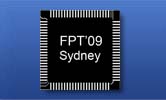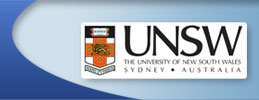FPT is the premier conference in the Asian region on field-programmable technologies including
reconfigurable computing devices and systems containing such components. Field-programmable devices
promise the flexibility of software with the performance of hardware. The development and
application of field-programmable technology have become important topics of research and development.
Field-programmable components are widely applied, such as in high-performance computing systems,
embedded and low-power control instruments, mobile communications, rapid prototyping and product
emulation.
Submissions are solicited on new research results and detailed tutorial expositions related to
field-programmable technologies, including but not limited to:
-
Tools and Design techniques for field-programmable technology including placement, routing, synthesis,
verification, debugging, run-time support, technology mapping, partitioning, parallelization,
timing optimization, design and run-time environments, languages and modelling techniques,
provably-correct development, intellectual property core based design, domain-specific development,
hardware/software co-design.
- Architectures for field-programmable technology including field programmable gate arrays, complex
programmable logic devices, coarse-grained reconfigurable arrays, field programmable interconnect,
field programmable analogue arrays, field programmable arithmetic arrays, memory architectures,
interface technologies, low-power techniques, adaptive devices, reconfigurable computing systems,
high-performance reconfigurable systems, evolvable hardware and adaptive computing, fault
tolerance and avoidance.
-
Device technology for field-programmable logic including programmable memories
such as non-volatile, dynamic and static memory cells and arrays, interconnect
devices, circuits and switches, and emerging VLSI device technologies.
-
Applications of field-programmable technology including biomedical and scientific computation
accelerators, network processors, real-time systems, rapid prototyping, hardware emulation, digital
signal processing, interactive multimedia, machine vision, computer graphics, cryptography,
robotics, manufacturing systems, embedded applications, evolvable and biologically-inspired
hardware.
Note that simply implementing an application using an FPGA is not sufficient to count as a research
contribution. Applications-based papers should emphasise novel design techniques or clearly
articulated and measured system performance benefits.
SUBMISSIONS
The program committee solicits papers describing original research or high quality tutorial expositions
in field-programmable technology including, but not limited to, the areas of interest indicated
above. High quality posters are also solicited. Current postgraduate research students are
invited to submit a short paper detailing their proposed research to be presented in a poster-based
PhD forum.
In addition to the above, the organizers solicit contributions to the following:
Papers should be prepared in PDF format using the template files provided and submitted electronically
via the conference website. Full papers should not exceed 8
pages in length, while posters should not exceed 4 pages in length. PhD forum papers are limited
to 2 pages.
FPT uses a blind reviewing system. Manuscripts must not identify authors or their affiliations.
Self-references should be blanked out. Papers that identify authors will NOT be considered.
Proposals for half and full day tutorials in the areas of interest are also sought.
Proposals for workshops or special sessions on particular topics are also invited.
Tutorials and workshops are likely to be scheduled for 7 or 8 December, preceding the conference.
Proposals for tutorials, workshops and special sessions should be sent to the tutorial and
workshops chair.
DESIGN COMPETITION
Following last year's success, we will again be hosting an FPGA design
competition at FPT'09. The theme of this year's competition is general
purpose computing on FPGAs.
The goal of this year's competition is to develop a general purpose
Sudoku solver on FPGAs. Submissions close 9 October 2009.
Please refer to the Design Competition link for more details.
SPONSORSHIP
Enquiries regarding financial sponsorship should be directed to the General Chair.
IMPORTANT DATES
| Proposals for workshops and special sessions: |
27 March 2009 |
| Notification for workshops and special sessions: |
10 April 2009 |
| Submission of regular/special session papers and tutorial proposals: |
22 June 2009 |
| Demo session submissions due: |
3 August 2009 |
| Notification of acceptance: |
10 August 2009 |
| Camera-ready papers and author registration due: |
21 September 2009 |
| Design competition entries due: |
9 October 2009 |
| Design competition poster submissions due: |
23 October 2009 |
16 October 2009 |
| Design competition shortlist announced: |
9 November 2009 |
ORGANIZING COMMITTEE
| General Chair: | Oliver Diessel (UNSW, Australia)
odiessel@cse.unsw.edu.au |
| Program Co-Chairs: | Neil Bergmann (UQ, Australia)
n.bergmann@itee.uq.edu.au |
| Lesley Shannon (SFU, Canada)
lshannon@ensc.sfu.ca |
| Tutorial and Workshops Chair: | Doug Maskell (NTU, Singapore)
ASDouglas@ntu.edu.sg |
| Special Session Chair: | Jean-Philippe Diguet (CNRS / Université Européenne de Bretagne, France)
jean-philippe.diguet@univ-ubs.fr |
| Demo Session Chair: | Suhaib Fahmy (Trinity College Dublin, Ireland)
suhaib.fahmy@tcd.ie |
| Design Competition Co-Chairs: | Hayden So (HKU, Hong Kong)
hso@eee.hku.hk |
| Satnam Singh (Microsoft, UK)
satnams@microsoft.com |
| Jorgen Peddersen (UNSW, Australia)
jorgenp@cse.unsw.edu.au |
| Treasurer: | Annie Guo (UNSW, Australia)
huig@cse.unsw.edu.au |
| Local Arrangements Chair: | Jorgen Peddersen (UNSW, Australia)
jorgenp@cse.unsw.edu.au |
| Publicity Co-Chairs: | Ali Akoglu (Arizona, USA)
akoglu@ece.arizona.edu |
| Khaled Benkrid (Edinburgh, UK)
k.benkrid@ieee.org |
| Web Co-Chairs: | Shannon Koh (Independent, USA)
shannonk@cse.unsw.edu.au |
| Molly Hu (Independent,USA)
cse_unsw@live.com |
|


